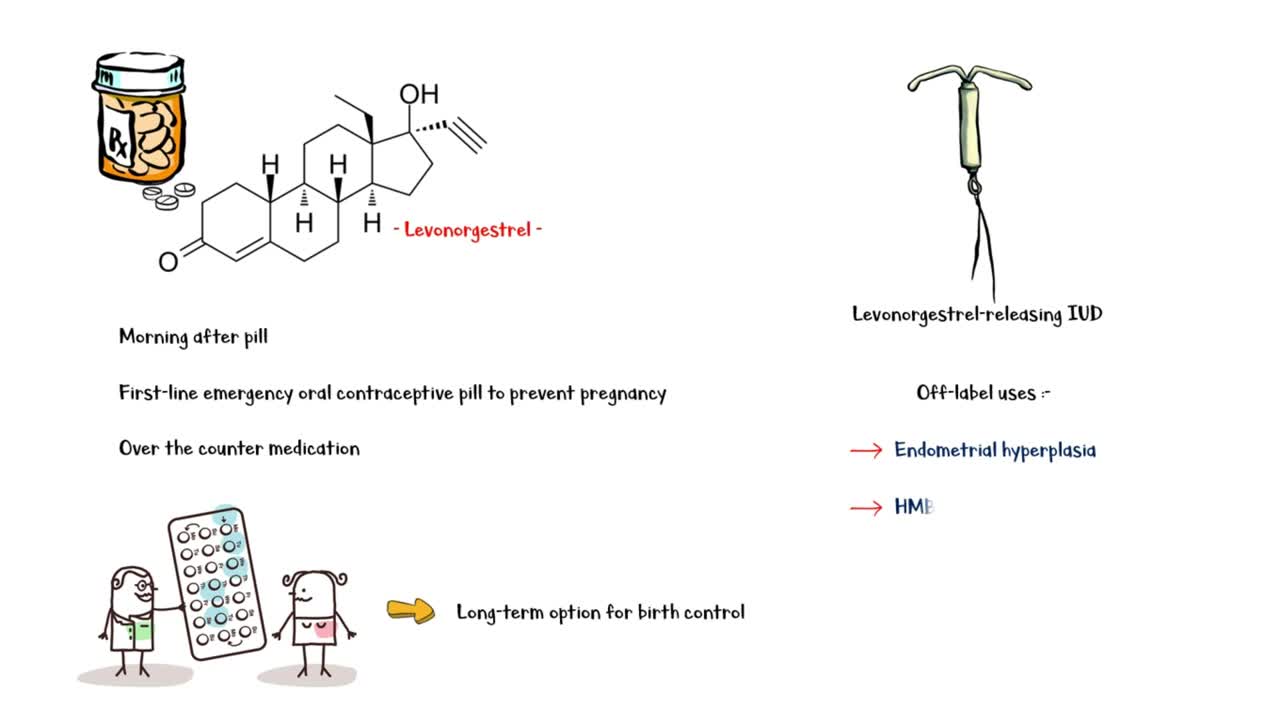Premium Only Content

Levonorgestrel (Morning After Pill) - Mechanism Of Action, Dose, Adverse Effects
Levonorgestrel, also known as the morning after pill, is the first line emergency contraceptive pill to prevent pregnancy.
It is available as an over the counter medication at local pharmacies.
It is also available as a combined oral contraceptive pill with estradiol as a long term option for birth control.
There is also a levonorgestrel releasing intra uterine device, to prevent pregnancy as a long term option.
Off label uses include, treatment of endometrial hyperplasia, heavy menstrual bleeding, endometriosis, and menopausal hormone therapy.
Levonorgestrel is a second generation synthetic progesterone, that binds to progesterone and androgen receptors, and inhibits the release of GNRH hormone from the hypothalamus. This will suppress the normal physiological LH hormone surge, which is required for the rupture of the follicle and release of the ovum. So, this will result in the inhibition of ovulation. It has been proven to be more effective when administered before ovulation.
For emergency contraception, the recommended dose of levonorgestrel is 1.5 mg oral tablet, taken within 72 hours following unprotected sexual intercourse. Adverse effects are minimal, and may include menstrual abnormalities. Nausea and vomiting. And headache. It is important to note that this is not a viable long term option for contraception. And it does not prevent people from getting sexually transmitted infections.
#emergencycontraceptivepill #levonorgestrel #medtoday
emergency contraception,birth control,morning after pill,plan b,emergency contraception side effects,can paracetamol be used for emergency contraception,emergency contraception ppt,how does emergency contraception work,emergency contraception slideshare,emergency contraception effectiveness
-
 2:23:55
2:23:55
Barry Cunningham
13 hours agoPRESIDENT TRUMP IS NOT PLAYING AROUND...AND THE LIBNUTS CAN'T STOP HIM!
100K64 -
 22:02
22:02
Stephen Gardner
19 hours ago🔥JUST IN: Trump BETRAYAL plot EXPOSED!
121K310 -
 38:32
38:32
The Why Files
21 days agoThe Real CIA Vol. 1: 693 Pages of Secret Crimes
133K61 -
 49:12
49:12
MattMorseTV
16 hours ago $22.72 earned🔴Zelenskyy is NOT HAPPY about Trump’s NEW DEAL.🔴
128K161 -
 1:03:49
1:03:49
Warren Smith - Secret Scholar Society
4 days ago"You are on the brink" - My Conversation with Nick Fuentes
93.2K66 -
 8:05
8:05
Tactical Advisor
18 hours agoNEW Best Budget AR15 | PSA Guardsman (FIRST LOOK)
84K29 -
 8:55
8:55
Warren Smith - Secret Scholar Society
3 days agoMatt Walsh EXPOSES a Leftist's Lie So Badly She Flees the Stage
71K32 -
 25:05
25:05
Digital Social Hour
17 hours ago $6.38 earnedScott Jennings: The Fight for Free Speech: Scott Jennings Speaks Out
54.8K14 -
 1:29:24
1:29:24
Steve-O's Wild Ride! Podcast
3 days ago $5.07 earnedDarby Allin Risked His Life And Career To Climb Mt Everest | Wild Ride #262
49.8K -
 49:33
49:33
Jeff Ahern
18 hours ago $7.43 earnedThe Sunday Show with Jeff Ahern
51.5K10